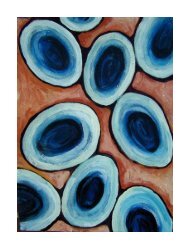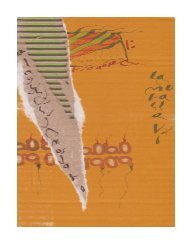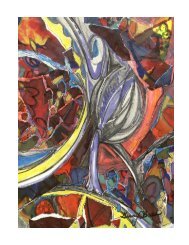Commentaries on Bob Cobbing - The Argotist Online
Commentaries on Bob Cobbing - The Argotist Online
Commentaries on Bob Cobbing - The Argotist Online
Create successful ePaper yourself
Turn your PDF publications into a flip-book with our unique Google optimized e-Paper software.
Children Safe in the Sea?, S<strong>on</strong>g Signals, the silk-screen Portrait of Robin Crozier, Processual and<br />
others were new territory.<br />
That, I suggest, is a generative way to view this work.<br />
It has been said that <strong>Cobbing</strong>’s work is all the same: it is the same in the way that each of his<br />
poems is unlike the majority of the rest and most unlike the generality of what passes for poetry.<br />
Call that “innovati<strong>on</strong>” if you want. I think you may be missing the important point.<br />
<strong>The</strong> idea of not offering a chr<strong>on</strong>ological exhibiti<strong>on</strong> is to encourage you to take each piece <strong>on</strong> its<br />
own terms in so far as those terms are discernible to you.<br />
If you are troubled at all by awareness that these works are said to be linguistic, then just put that<br />
out of your mind. If he were here, I know that <strong>Bob</strong>’s approach would be to start from where you<br />
are.<br />
If it doesn’t bother you, then you might ask yourself what that means and what it might or could<br />
mean.<br />
<strong>Cobbing</strong> was a generous encourager of others. He was patient. He wasn’t much taken by laziness.<br />
He hated disloyalty and dish<strong>on</strong>esty. He was impatient with that.<br />
He never had much interest in c<strong>on</strong>trolling.<br />
I make that last comment because it was asserted <strong>on</strong> BBC Radio 4 last week that he excluded<br />
poetry which was not like his or not to his liking from the programme of <strong>The</strong> Poetry Society. (He<br />
never had such power over the events programme. Any member of the general council of <strong>The</strong><br />
Poetry Society, like the accuser, would know that.)<br />
It was also said by the same pers<strong>on</strong> that ‘Beethoven Today’ works <strong>on</strong> variati<strong>on</strong>s <strong>on</strong> both words of<br />
the title. Well, there are two versi<strong>on</strong>s of that poem here and you may check the gentleman’s<br />
reliability.<br />
Perhaps the struggle of the 1970s, in what has been called “<strong>The</strong> Poetry Wars”, was not for<br />
Modernism; but between Mediocrity and however we describe its opposite. (We can’t really say<br />
“excellence” because the word has already been hijacked to the service of Mediocrity.)<br />
<strong>Cobbing</strong> as campaigner sought, am<strong>on</strong>gst other things, to open the door to all Poetries against the<br />
wishes of a de facto Mediocrity elite which limited access to a few forms; and that included<br />
including what was then usually called “experimental”. This was happening already; <strong>Cobbing</strong> was<br />
part of a zeitgeist. He was regarded as an experimentalist; but he did not want it to stop there.<br />
From <strong>Cobbing</strong>, I learned first to listen to Ornette Coleman. I also read Vachel Lindsey and Charlotte<br />
Mew.<br />
Those mediocre poets we’d hear of then had followed <strong>The</strong> Movement et cetera; now some<br />
followed the “experimental” or “the Americans” and so <strong>on</strong>. (I simplify grossly.)












